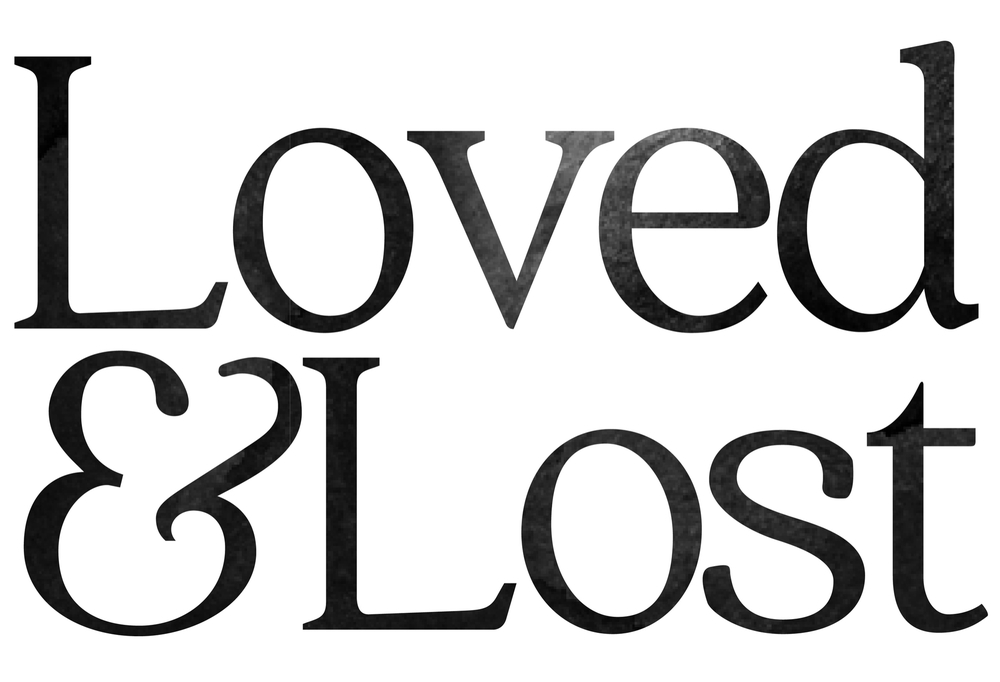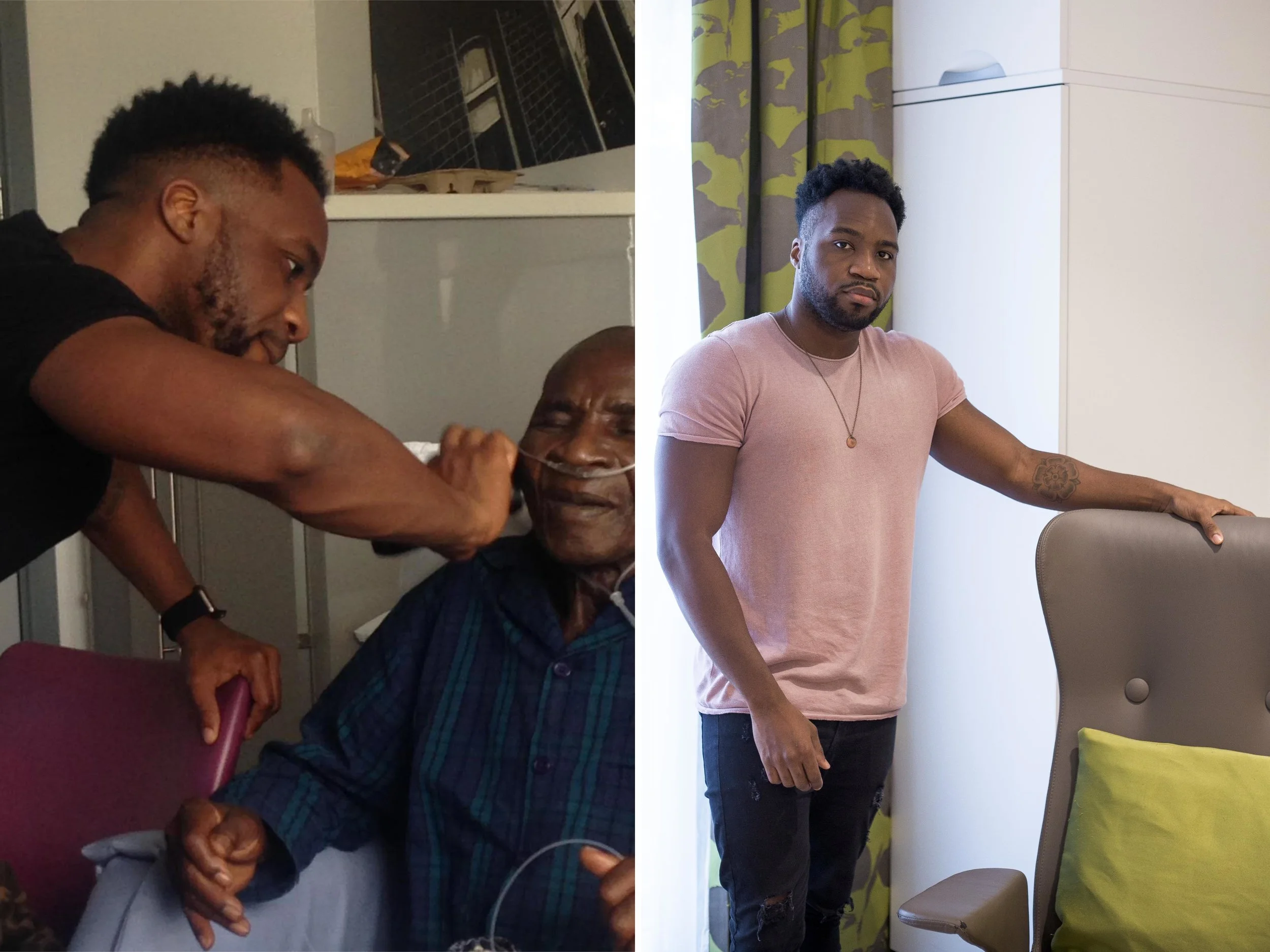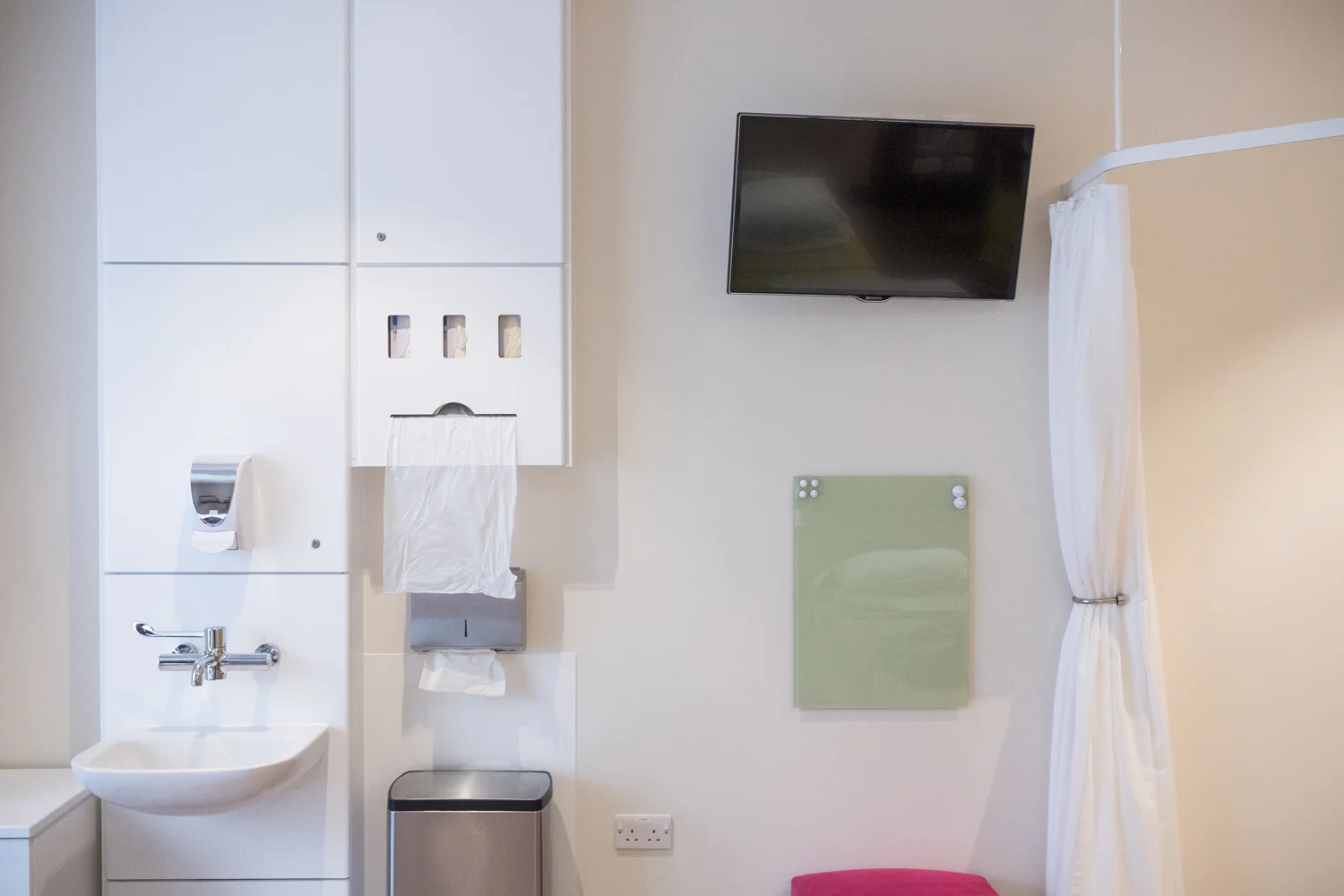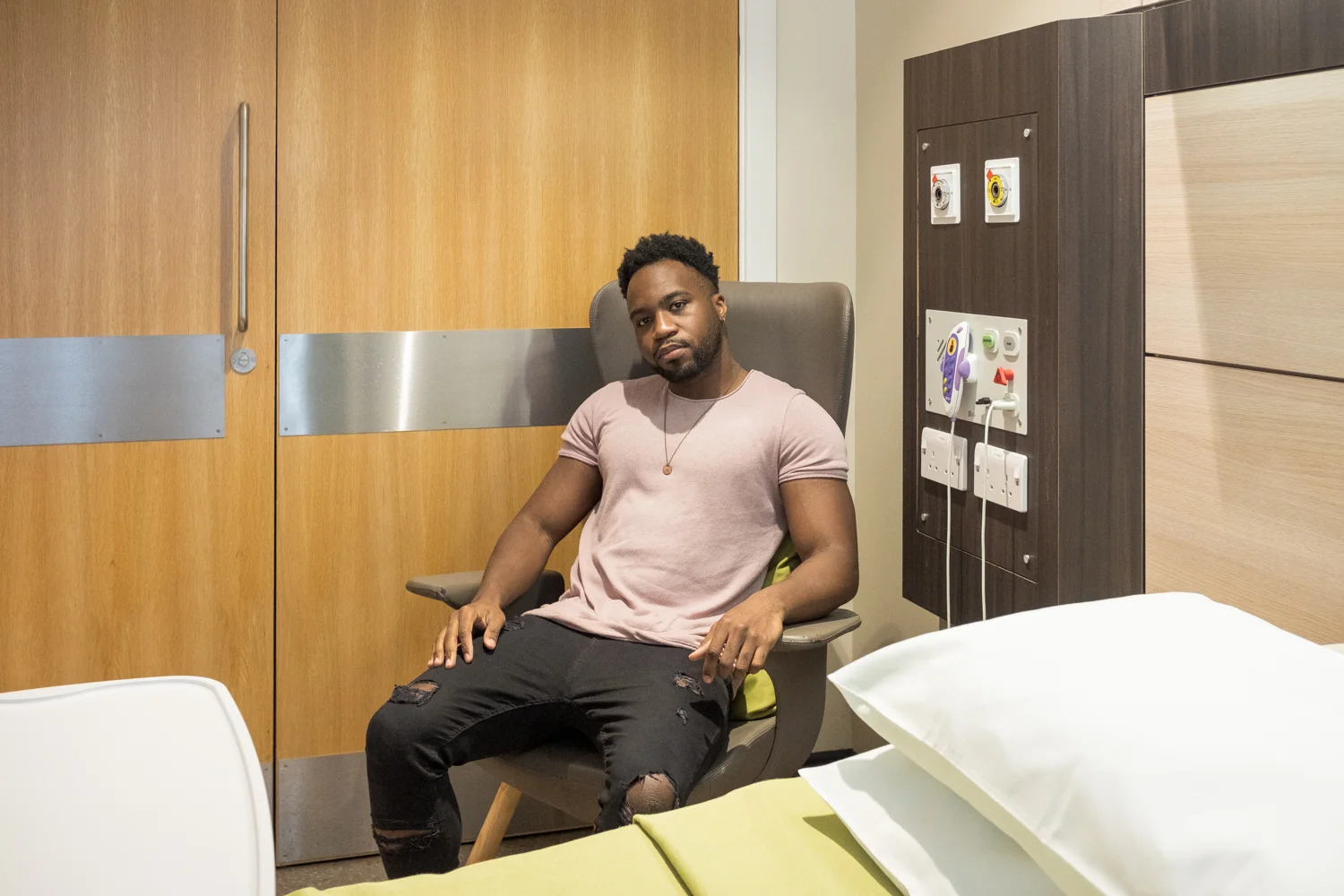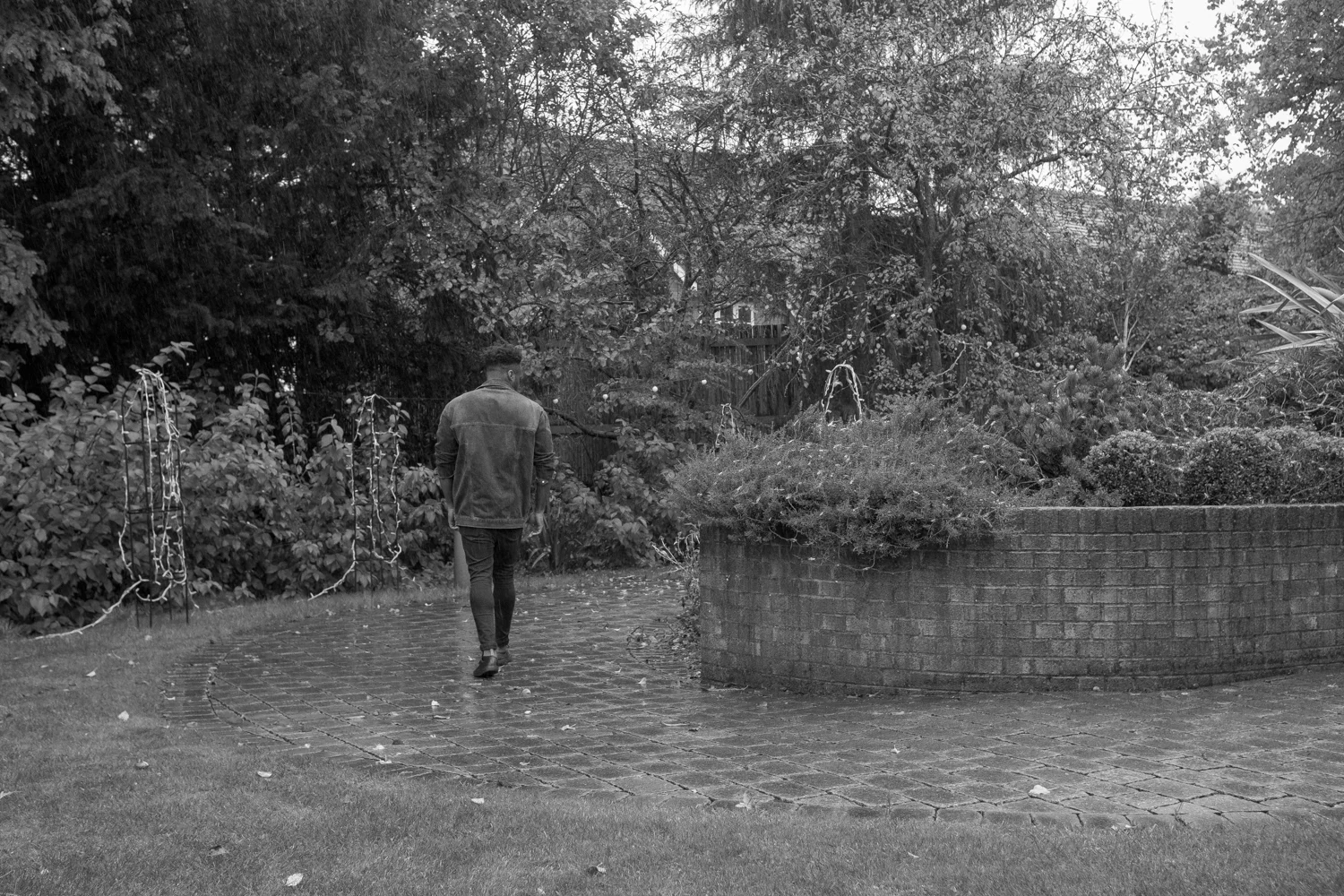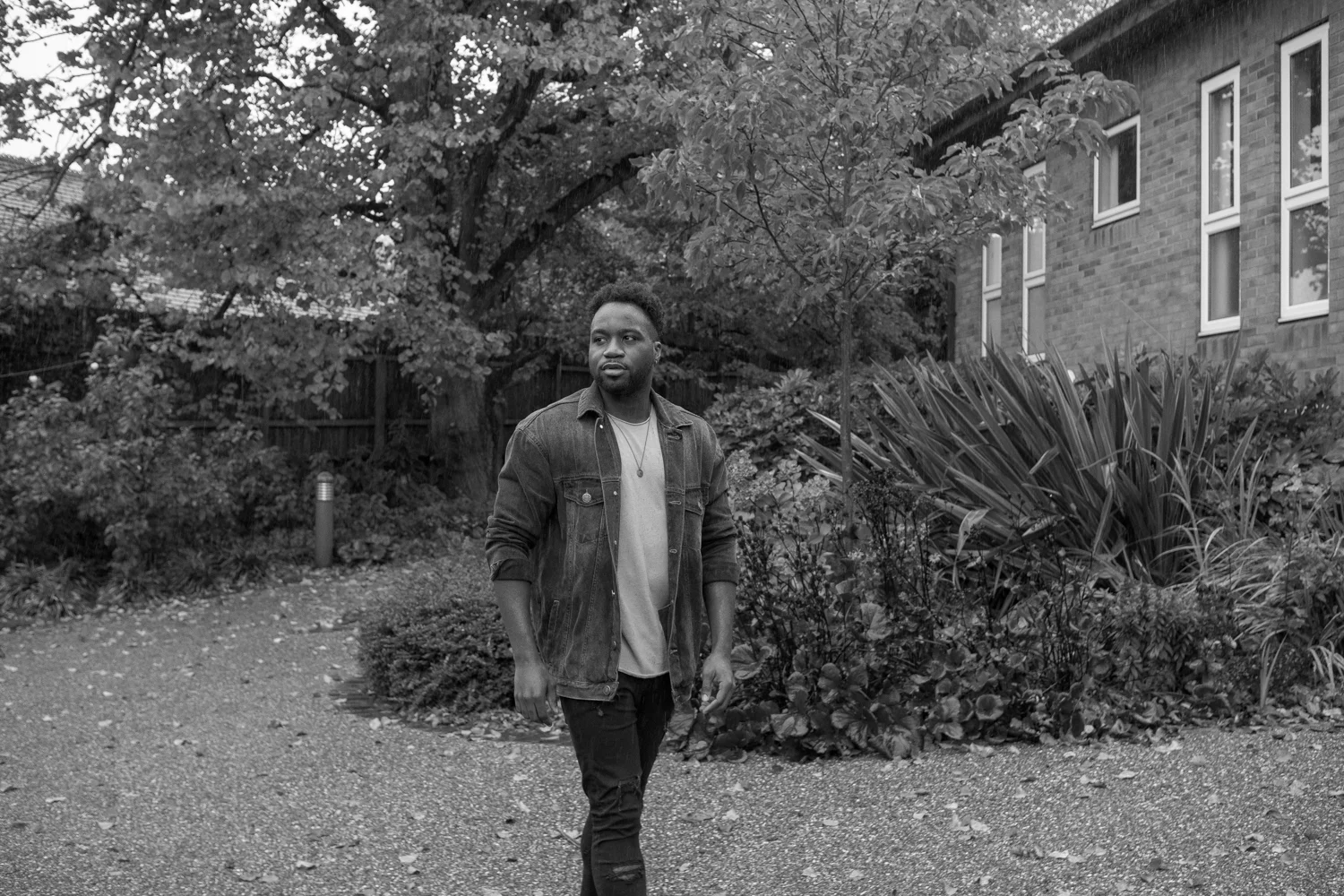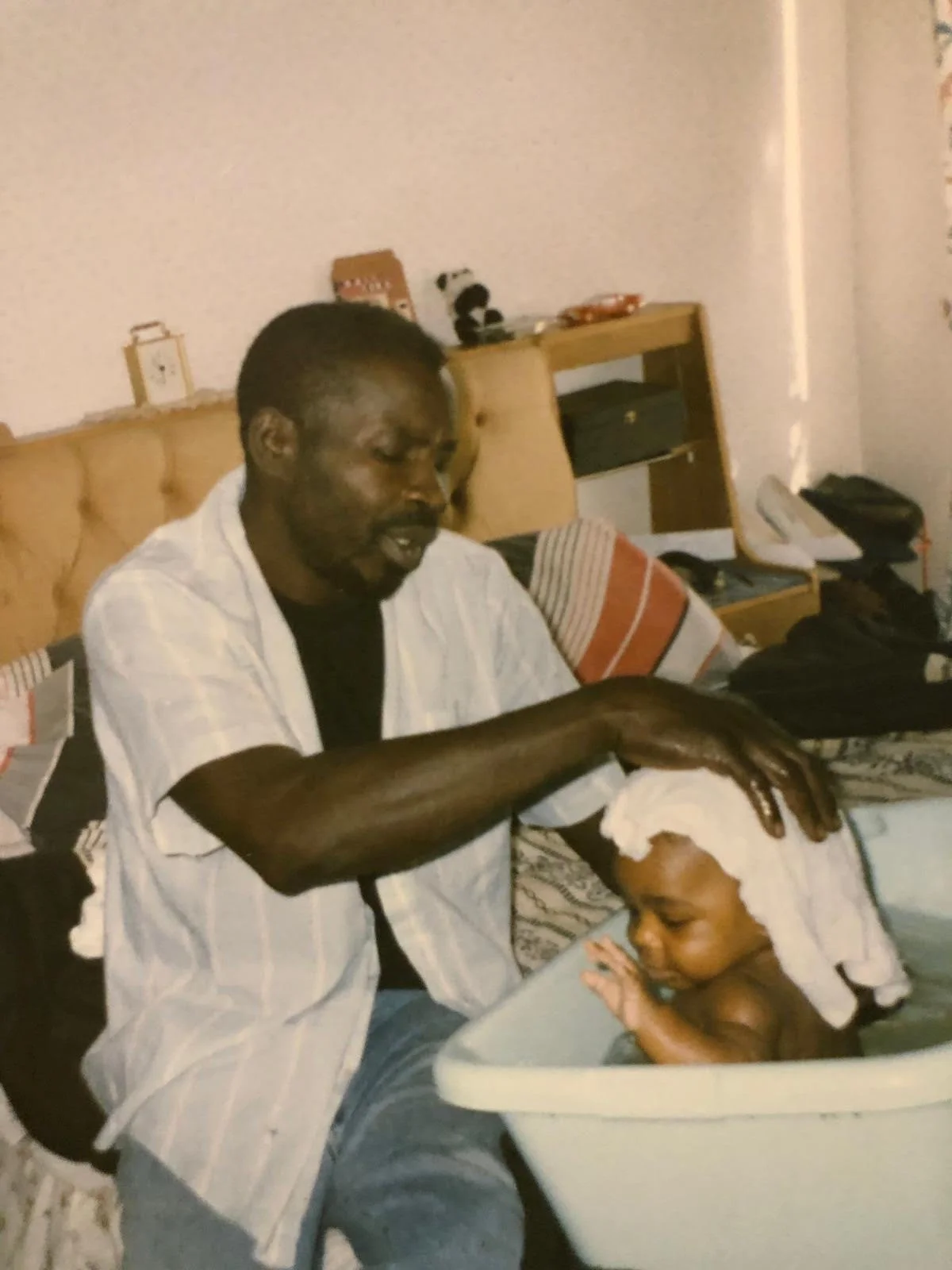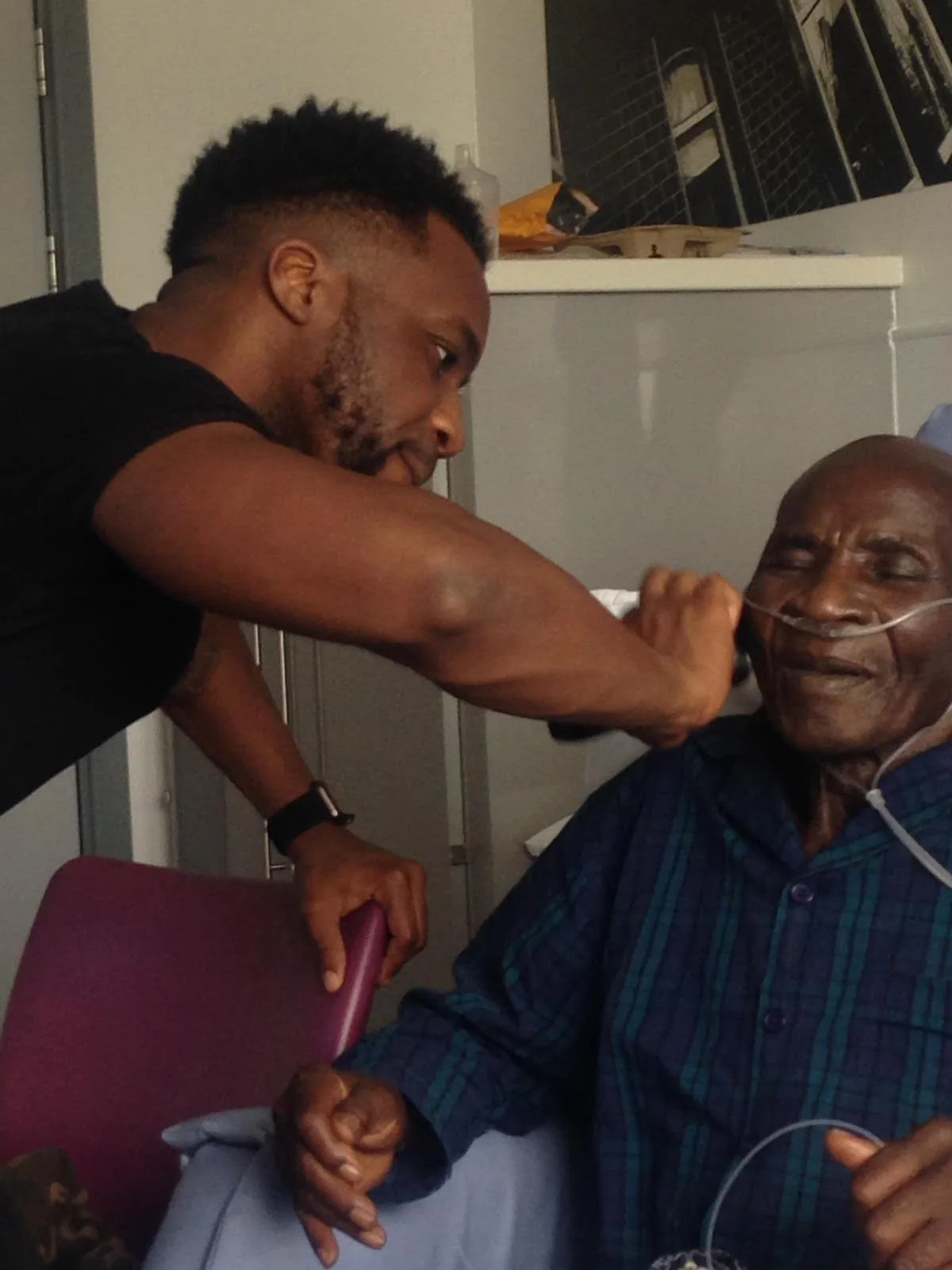Kyle & Bob
Sheffield
Could you tell me a bit about the original photograph?
My name's Kyle Campbell. My grandad was in St Luke's for I think about 10 days-ish. The original photograph was me giving him a shave - I didn't even know it was taken, my mum actually took it when I wasn't looking. It was giving him that sense of dignity and making him feel like he was himself, because when you're in that situation where you’re sat, not really doing much, and he knew that his life was coming to an end, he didn't really feel himself. It was just giving him that sense of normality back and an everyday thing like having a shave just makes you feel yourself, you feel at home. It was a really special moment.
How was it special?
It's these sorts of things that you kind of remember and it was him asking me to do it. And I knew he couldn't do it for himself so it felt a lot for me, it was like a big responsibility for me to help. He's a Jamaican man and Jamaicans do tend to be quite proud people and to ask for anybody to do anything for them is a really big step and for my Grandad it was, it was such a big step to ask for help because he never really asked for help when he was at his most ill and he had visitors asking how far he could walk and how much he could do for himself and if he could feed himself and he was still giving the answers that he could when he couldn't so that last bit of dignity he had was him asking me for help and that meant a lot to me.
I suppose he was going through that process of having to admit to himself that he can’t do certain things and let go of that sense of pride a little bit, but as you say, that's married with that sense of dignity. So was giving him a shave, was that something that you did regularly or was it a one off?
Yeah, I did that regularly. I did that most mornings when I was here. He'd normally wake up and he'd ask me to do it or sometimes he'd be asleep when I'd start doing it and he'd sort of like plump his cheeks out so I could get all the other bits or he'd call me back and say there were bits that I'd not done properly. But it's those moments that you really remember and you hold on to.
And was that sort of one of a few things that you were able to do for him at that time?
Yeah, when he could I used to get the occasional text or phonecall where he'd be asking me to go to the shop and fetch him ice cream, so I got that quite a lot. Or, 'you promised me ice cream yesterday why aren't you here?'
Did he have a particular favourite?
Yeah, I bought him some Hagen Daas once and he kept calling it the good one, 'bring me that good ice cream'.
The most expensive one!
Yeah!
“You kind of feel like you've got to move on yourself but grief can hold you in that state sometimes and I kind of feel that as time's gone on I've kind of learnt to deal with the fact that grandad's not there, but he's always going to be part of me, in my memories and when I do have children, there's stories that I can tell them about grandad.”
You said your mum took the photo, is that right?
Yeah
So would you come to visit as a family, were there quite a few of you that would come?
Yeah, so my grandad actually had a lot of kids. At the start he had 8 kids so there were quite a large amount of people visiting him which was great for him. I'm sure for other people on the ward it was a bit distracting cos you'd forever got people coming through the door. But he was never on his own and I think that's one of the things that he loved. The one thing that he always said that he was scared about in terms of passing away was not being able to look after his family so for us being in that situation where we could spend the last moments with him was just the best.
I never had the pleasure of meeting him but I can say with a certain amount of certainty that he really would have appreciated having everyone around, I'm sure that meant a huge amount to him to have you there, by his side when he needed you most. I've lost grandparents as well and. there's this transition period where they have to admit that they’ve done all this looking after everyone else, and then they have to be looked after and that's probably quite a tough transition to make.
Yeah, I think especially with, like males and grandfathers. They can't let go because their whole life they've been the protector and especially coming from, I think it was the 50s and 60s, in the windrush where my grandad came over from Jamaica. Even when he came over, he was sending money back to look after my nan, he was still that main primary carer, even though he was so far away. He kind of never let that go. So when it did come to him being ill, he was still wondering 'Oh, have you eaten', 'here's some money you go and get some food, you make sure that you're okay' or 'you've not slept, you sleep, I’lll be fine', he couldn't let that part of him, part of him go.
He sounds like a real gent. Just thinking of others and looking after everyone else. I suppose with a big family, with 8 kids, he probably didn't have much time to think about his own interests. He's just thinking about everyone else and making sure everyone else is doing okay.
Yeah
“Growing up he was the only person that could stop me from crying. He had this big jukebox in the corner of his room and he used to go and put a reggae album on and he'd sort of pick me up and he'd sort of rock me a bit and then I'd stop crying. It was like his sort of special skill. I think because he was always there from when I was young, I always had that trust with him.”
You've told me a little bit - but what was he like, what was his character like? Who was he to you?
My dad wasn't around much growing up, my grandad was more like a dad to me. So when it came to learning how to shave or getting advice about girls at school or wondering what car to buy or if a car needed mending or anything, we always went to grandad. Or if you were going on a date and needed a haircut, you went to grandad and he was sort of the protector and a dad to us all. And there were so many of us grandkids that grew up without fathers and he was there for all of us.
That's amazing, so not only was he a dad to 8, he was a grandad to…
Oh god! Erm, I think it was about 30!
Gosh, he had his work cut out dishing out all that advice!
Yeah
Was he good at giving advice?
No. I remember once I split up with one of my exes and I was totally distraught. I went round and I'd not been eating and I said 'Grandad I'm so upset' and he just said to me 'I'm gonna give you a little bit of advice, you're a child, then you're an adult and then you're a parent' and then he proceeded to drink his rum and that was the end of the story.
And what did you take from that?
I just took it for what it was, I just thought he must mean something or think about that and whilst I was thinking about that my mind wasn't upon the thing that was bothering me so maybe that's what he had in mind.
He must have thought there was something in there that was crucial life advice. Maybe in years to come that'll sink in and you'll suss it out.
Yeah, he was always a do it yourself sort of person. I remember coming to his house one day and he was painting the ceiling above his stairs and I don't know if you've met Jamaicans before but they have no concept of health and safety. So when he was painting above the stairs he propped his ladder on the stairs, I think it was with 3 yellow pages.
Not good
No, that's just how he was, he just didn't think about those sorts of things. Like my mum's first car he managed to set on fire - he was welding for her, he was welding with the window open and the car caught fire!
What, cos a spark went in the car?
Yeah, and then he forgot to tell the fire brigade that he'd left the oxygen on, but that was grandad - he was that sort of person.
So there are some stories to tell then?
Ah, there's so many stories
Have you got other favourites?
My auntie spent, I think it was a good 500, 600 quid on a brand new table for his dining room and the next time she saw him he'd taken the table apart piece by piece and arranged it into a bed and it was now his new bed.
What he'd just like turned it up and put a mattress on it?
Yeah, he'd cut it up, put it into pieces and made it into a bed and that was the end of the table.
So he thought, I don't need a table, I need a bed!
Yeah!
You wrote a lovely tribute about your grandad for St Luke's and you mentioned in that how he was a good listener. I think that's so important these days, for everyone to have someone who's going to listen to you. It's such a good thing to be able to talk.
Yeah, it's all about having that openness and I know especially in regard to males and mental health. It's hard to open up sometimes and whoever it was in the family or friends, you could always go round to grandad and he'd put the kettle on and even sometimes he wouldn't necessarily give advice but you could just talk. Sometimes it's just nice to talk cos whatever's bothering you comes out and once it's a load off you, you feel like it's shared.
Yeah, for sure, absolutely and I suppose there's a lot to be said for listening but also having the time for everyone
Yeah, he always had the time, he always left his door open. And you knew whether it was 8 o'clock in the morning or it was 10, 11 o'clock at night you could go and talk, as long as it wasn't during Formula 1 time you could go and have a chat with him.
He was a big Formula One fan?
He loved Formula One! He had.. I think his favourite possession, he had a Lewis Hamilton hat and Lewis Hamilton t-shirt and he wore them all the time. That was like his live-in day clothes. Hhe went to Silverstone a few times as well.
That's amazing. So, he's had a good few years if he's a Lewis Hamilton fan. He's done alright then, he's backed a winner there, that's great! How does it feel now that grandad's not around?
It's difficult cos there's times that sometimes you do feel like you want to open up and you realise that he's not there to go and open up to. But I know he wouldn't have left us all in this position if he didn't feel like he could and it would be okay.
So you feel like he's almost set you up in a way?
Yeah, he's set us up to be okay without him and that's one of things before he passed that my auntie said to him is 'just don't worry about us all because we'll all be absolutely fine' and I think for him that was the best thing that he could hear cos it was his main worry is people not coping without him.
Yeah, I suppose if he's been that protector, provider and listening ear and advice giver for so many years, you do worry about that gap that you're going to leave behind for people.
Yeah and obviously for a lot of his grandkids without our fathers being there, he knew that perhaps there was a gap that was going to open up with him gone. But the daughters and sons that he's raised are so strong anyway, I think we'll all be okay in the end regardless.
You talked about him coming over as part of that Windrush movement. Did he ever talk about that?
He shared quite a few stories when he was ill. There's things that we found out about him that he never told us before. We'd never known that he'd been to Spain but apparently when he came across from the Windrush, the boat first stopped in Tenerife. We were watching something on the news and he said 'Oh I've been to Tenerife' and we were like 'when have you ever been to Teneriffe?' and he was like 'Oh when I came across on the boat and it stopped there'.
He came across and he did so many jobs - I know he was a mechanic, and he's worked on public transport, he's worked on people's houses, he's done building work - he's done pretty much everything. He was a man of many trades, which is why when it did come to obviously taking apart a table and putting it back together as a bed, he knew how to do those things.
He didn't think twice about it!
No, no, he said what do I need right now?
“The end is only the end as long as you let it be. You can forever learn more about somebody even when they're gone, you're still learning.”
What did it feel like for you today to come back to St Luke's, to go and restage that picture. What emotions did that evoke for you?
At first I kind of felt like it was going to be a lot more difficult than it is. Because you kind of feel like it's going to be a sense of closure cos you know that the room is now occupied by somebody else and their staff have kind of moved on. My grandad's moved on and you kind of feel like you've got to move on yourself but grief can hold you in that state sometimes and I kind of feel that as time's gone on I've kind of learnt to deal with the fact that grandad's not there but he's always going to be part of me, in my memories and when I do have children, there's stories that I can tell them about grandad, who he was and what he was like. Those things do stay with you and these are things that I'm never going to forget, they'll never leave me.
There's a sort of notion about the fact that when somebody dies, they're not gone until people stop talking about them, that's sort of what you've just alluded to.
Yeah
Because I know for me in my circumstance, I've lost grandparents, I've lost my dad, I've also lost my sister, and I don't want them to be forgotten. I want my kids to know who they were and how important they were to me and I think that's really important that, whether it's stories or memories or whatever you talk about them. But you said something else about how they live on through you?
The end is only the end as long as you let it be. And I think one of the things that he's left behind is legacy. There's so many stories that I've been taught and I've heard about since he's passed that kind of reaffirm to me just who he was. I don't see my dad very often but one of the stories that my dad told me was he remembers back in the 80s, my grandad had a big, it was a really big, massive brown car and they were all sliding across the bonnet pretending to be Starsky and Hutch. My dad remembers falling over hitting a wall and my grandad walking up to him and calling him stupid. And these were stories that I'd never heard about, I mean I'd never seen him in this light cos I didn't see him as a young man. But you can forever learn more about somebody even when they're gone, you're still learning.
What are the things of him, of his character, that you think you've inherited?
The willingness to just not say no. It's hard work and graft and sometimes you've got to take a leap of faith, it was a big thing for him coming across in the 60s from Jamaica and being a black man in England. It was a lot back in those times because he wasn't necessarily liked all the time and it wasn't an easy ride but he did it because he knew it was the best thing for his family. Part of the legacy I mentioned before is the fact that he's left me with the skills now to grow up in this country where I've been to University, my mum's been to University, my brother's been to University and staying in Jamaica these are things that necessarily might not have happened. So that decision that he made is still affecting our lives today and it will continue to.
Yeah, that's huge, isn't it? That's given me shivers actually. That's massive for him to have made that call and to offer all the future generations of his family a new platform, and I'm not saying better or worse but a greater level of opportunity, that opportunity to go to University. You said he did lots of different jobs and lots of practical things, relatively humble professions, but he's given, through the decisions he's made, he's given you a platform to go on and do whatever you want.
Yeah, I went to Jamaica last summer for the first time and a lot of my cousins in Jamaica and my grandad's sister were telling me stories. They took me around the village in Spring Garden where he grew up, not too far from the grill and for me, growing up in England, I've got this dual sort of heritage thing where I've never felt like... This is home but it's not always where I belong and being in Jamaica it's, it was people telling stories of 'Oh, this is the church where your grandad used to ring the church bell when he was 5 years old' and 'this is the school that he went to', 'this is where he used to sneak around to the next village school and see your nan' and everything. It explained to me who he was and how he developed into the person that he was as well as for me seeing this is where home comes from.
So that must have filled in a lot of gaps for you practically, you know seeing what was there but also emotionally. How did that really feel?
I remember the last day that I spent in Jamaica, I burst into tears because everything just made sense. I had the beginning of the story missing in terms of myself and my grandad, and that part of our identity. Coming back and speaking to him about it all, telling him about how I met his sister and it all kind of like came to fruition, it all made sense for me.
I don't want to put words in your mouth but did you almost feel a bit more complete in yourself through that experience?
Oh, one hundred percent. One hundred per cent. I felt more belonging to the Jamaican side of my identity and I felt more like I could connect to my grandad because there were new things that I could talk to him about that before I never had the chance to and he opened up a lot more.
What instigated that trip in the first place to Jamaica?
I've always wanted to go and never really had the opportunity to. Some of my family from down south were down there and one of my cousins, he drove up to our hotel and he said that he wanted to show us everything that he could possibly attempt to show us whilst we were there and I met so much of my family. I remember being taken to a bar and in the bar he said to me everybody in this bar is related to you in someway. He said the shops on this street are all owned by people in your family and I'd never seen that sort of side of me before and it's looking at this one little village in Jamaica and looking at how much this Titus surname had created. So for me it was more than just a holiday or just a trip abroad, it was discovering myself and it was reinventing myself and it was giving me the tools to sort of see from where I'd been and where my grandad's been to where am I going in the future.
It sounds almost like pilgrimage, like a returning to origins sort of thing.
Definitely, yeah definitely.
Are there ways in which you pay tribute to your grandad. Obviously there are anniversaries and things, but maybe you'll go back to Jamaica? Or are there things you've done already or would like to do to pay tribute to your grandad?
I definitely want to go back to Jamaica. I know it's hard for his sister because they don't have much in Jamaica. She wasn't able to travel across and be here for the funeral. He has a brother down in Reading I know he was really unwell and he couldn't come and visit him, so definitely going to Jamaica again, that'd be just unreal for me.
And that would be a good way to honour him?
Oh definitely, yeah. When his Formula One's on, I do go and visit his graveside and I'll tell him who's won. I'm sure he'll be happy to know that Lewis is winning most races at the moment. He'd be blessed to know that.
I used to do a similar thing with my dad. We were both Southampton fans and we used to go together and I moved on to University so we couldn't go as often as we used to. Southampton don't win very often but when they do I used to pick up my phone and think I'll text dad and tell him 'Oh, have you seen the score' you know, he's not around, it's weird isn't it, but you feel like you should say something.
One of the things he loved was politics and he used to have BBC parliament on non-stop. And with all this and Brexit and stuff, he would have loved to see how this has all gone. It would have been great for him, yeah.
Really?
Yeah.
Just as entertainment almost?
Yeah, he used watch BBC Parliament on a reel for a good 10 hour spin and he wouldn't get bored.
Wow. What about all the Windrush scandal, what did he make of all that?
He found it quite difficult because some of the people that came across are people that he might have known. For him it was hard to see people who were innocent in this situation who had come across for a better life. I know many of them lost their houses and lost access to their healthcare that they were given, and some had been deported and here he is in the situation where he's still got his house and he's fine and he's secure and his family are okay, so it was difficult for him.
This isn't the first time that you've been back to St Luke's?
No. So, I actually do support work for a care company. I think it was a week after my grandad passed I actually came back - it was the room next to his - to look after one of the clients and I remember all the staff were saying 'are you back' and 'why are you back?' and I was like, 'I'm working here' 'you're working here so soon?', and they still took a load of care of me and they still made sure that throughout the night they were supplying me with coffees and sweets and it was, it was really nice.
And that must have been difficult to come back?
It was a really surreal feeling because I walked past the door that obviously my grandad was in and it was someone else's room now. And that was the hardest thing to accept was that everything had moved on. And even though I was still in that state of grief where I kind of missed him, the world doesn't really stop for you. And people's everyday struggles continue and other people get sick and it's kind of, it kind of reaffirmed to me that I have to be strong enough to carry on. And I'm glad that I did come back cos it taught me a lot about myself in regards to grief.
In what sense?
In that I know growing up as a youngster, my grandma passed when I was 10. It was the sort of grief where I remember crying over and over again and not eating and not being able to let go. And with my grandad being unwell, I think partly due to knowing that he was going to pass, it wasn't that feeling of 'oh my god he's gone', it was 'he's not in pain anymore' and I remember seeing him for the first time after he passed and he looked peaceful - there wasn't the pain and he wasn't struggling to breathe and he looked more like my grandad after he'd passed than he ever did when he was unwell.
Wow, that's amazing. So there's a certain level of acceptance there on your behalf?
Yeah.
Which, did that feel like you could accept it quite naturally? Did you have to sort of convince yourself of that, or was it quite like...?
As part of my job, you learn to become sort of hardened to death - it's a matter of life and these things happen, people are born and people die. And you do get, I mean one of the things people say is you've got to remain professional in support and care work, which I agree to, but you're not doing your job as a carer if you don't care. I wouldn't want anyone looking after my grandad if they didn't care.
I remember once we had a client who'd passed away and his family looked at us for support and his wife said to me 'what do I do now?' like, 'who do I ring? what's next?'. In the moment where all his family are crying and being upset, they looked to me as that pillar of support and you kind of have to learn to harden yourself and be the professional person. With my grandad passing, you tried to be hardened to it because you can see the rest of the family sort of, it consumes and affects them in a certain way and I didn't let anyone see me get upset, or I didn't let anyone see me cry cos in a way I didn't feel like I could or I should. And then, I remember in the few days following I kind of opened up a bit more about it.
Do you feel like you felt ashamed of being upset about it?
I knew that being upset isn't what he would have wanted. I remember coming to visit him one day at St Luke's and we were sat around his beside and he went through a stage of getting better and he'd be better for a few days and then he'd get worse for a few days. One of the staff at St Luke's said they didn't know how long he was going to have left and a lot of my cousins were crying and burst into tears and he just looked up and he just said 'can you please leave the room', he said 'this is not the place for that'. So he was the sort of person that he wouldn't want us being upset and crying and stuff. The one thing he asked and requested from the whole family for his funeral is 'I don't want you to be upset, I just want a big party'. So I kind of felt guilty not respecting his wishes by being upset and that's part of the reason why I didn't want to show anybody that I was.
It's hard in that... there's a difficult sort of boundary there isn't there where, you know, it's desperately sad when you've lost someone you dearly love but there's a huge amount to be thankful for in the life that they'd led, and the opportunities they've had, and the love that they've shown and the love that they've received. I think it's a very mature way that you're approaching it. It's difficult to know how to go about that because there's actually a lot of rituals around losing somebody and going through the funeral, or services, there's various church services or whatever you decide to do that allow people to sort of publicly acknowledge the loss and the grief and let stuff out erm…
There's a few ways to sort of grieve and the way I see it is there's people that kind of let go and they don't do anything and they kind of just let the moment hold them. Whereas the way that my grandad raised a lot of my family was to do - when you're upset you do. Which is why I sort of did the tribute and the raising money for St Luke's and a lot of his funeral, I know especially like the programme and stuff I did myself on my laptop. I wanted to do as much as I physically possibly could for him and that sort of took away from feeling like I didn't do enough. And I know that the outcome, he would have been happy with.
Yeah, I can one hundred per cent relate to that. When my sister died last year, that's all I wanted to do like some days I just, I felt so sick I couldn't do anything but when there was a task there, I was like yeah, I did exactly.. I had my laptop, I made the programme, I found all the photos I could possibly find to make a slideshow and stuff, I was like I've got to do something I have to be proactive, feel like I'm making some sort of contribution. I'm not going to make up for anything that's gone but I feel like I can, you know, help somehow by doing these practical things.
Yeah, and it was doing and for my grandad I know he was, he was such a proud man I know he'd never admit to being it, but he was scared. And it was by me doing so much it was kind of thanking him for going through that dark place. My auntie passed away in the November before my grandad who passed away in June, and she ended up in Weston Park hospital where my grandad ended up. And it was only 3 weeks after she passed that we found out my grandad was unwell and it was hard for us seeing this guy who's always been the protector. At first obviously seeing his daughter not get through it and I remember being at his house one day and he just looked at me and looked at my nan and just said 'I give up'. And I've always seen grandad as that figure who looked after everybody and what do you say to someone like that when they say that they just give up?
Was that after he'd been diagnosed?
Yeah. He went round to having carers and at first when he did have carers at home, he was sending them away and he wasn't taking his medication and he was putting his medication in the bin and it was a period of real hardship at first, I think. As time went on he kind of learnt to accept being unwell and with that he kind of, he developed as a person and became that person that would ask for help. The grandad that I knew from just 6 months before was totally different from the gent that passed away.
I mean, I can't imagine anything much harder than having to accept a terminal illness. You know, I think I completely understand his response.
I think for him he'd seen my auntie and my auntie's 20, 30 years younger than him and it was 'if she can't get through that stage what hopes do I have'?
“My grandad did it all, he always got involved in that sort of the stuff with the kids, so whether it was giving us haircuts and looking after us or giving us baths when we were younger, he was always the person to do that. Like I said he was always the carer from the start. And for me to look after him was sort of the story coming full circle.”
There's a beautiful photo which you showed me of you as a little kid, as a youngster.
Definitely, I was basically a toddler, yeah.
And, your grandad's giving you a haircut and I think, are you in the bath?
Yeah, so my grandad did it all, he always got involved in that sort of the stuff with the kids, so whether it was giving us haircuts and looking after us or giving us baths when we were younger, he was always the person to do that. Like I said he was always the carer from the start. And for me to look after him was sort of the story coming full circle.
Yeah, and that's what I was going to say. It's a beautiful thing that you could, you know, when he needed it most you could return that favour and be the one giving him a shave even if you did miss a bit every now and then.
He was, growing up he was the only person when I was a child that could stop me from crying. He was the only person and he had this big jukebox in the corner of his room and he used to go and put a reggae album on and he'd sort of pick me up and he'd sort of shake me a bit and then I'd stop crying. And it was like his sort of special skill he was, he was always that person. And I think because he was always there from when I was young, I always had that trust with him.
That's amazing, that's beautiful. Is there anything you wanted to add? You've given an amazing picture of who he was and your relationship with him and and how you've responded. It's remarkable, I really appreciate you being so willing and open.
Thanks
I appreciate its not an easy thing to do. I had to make my own story and I got a friend to interview me and it was difficult because you know I was talking about my dad but I wanted to put myself in the position of you, where you are now and know what it's like and I found myself saying stuff that I was like 'I didn't know I thought that'.
Yeah, it's weird. I didn't realise at the start that I felt guilty and I didn't...it's weird how things come out cos when I was talking about not opening up, I didn't realise I was like that until I said it and I didn't want anyone to see me being upset because when the main guy in the family that did the looking after's gone who's going to be the next person that people look to and for me in a way it was kind of, is it going to be me and if so can I let anyone see me being weak?
Do you feel like that is you now are you that person?
In a way I feel I am. After his funeral I did so much and my aunties and uncles being so thankful. My auntie and my cousin did the slideshow and I put them all together, put them into a big video file and I set that up as well in the hall where we took my grandad. I remember I did all the funeral programmes, I did all the fundraising, I remember I was one of the people help lift and move the coffin into the church and it was all the little things like that that.. helped them clear out his house.
There's so much stuff isn't there, there's so much to do?
Yeah, I did do a lot. I kind of felt like I owed it to him to do that.
But I hope you don't feel like you need to fill his shoes necessarily.
I don't think I could fill his shoes, but I kind of feel like I have to sort of be a more harder working more mature version of myself because he knew that's what I could have been.
So would you say that the experience has made you a better person in that sense?
Yeah, definitely.
You've learnt more about yourself
Yeah, I feel more of a... I feel more mature in terms of things, my wants and things that I want to do. I've a clearer vision of where I want to go.
It does crystalise stuff, doesn't it?
Yeah
It brings stuff into focus
You see the state that we're in is a temporary state and you have to make the best of the small moment that you're here. Because one day there's going to be me potentially sat in a hospital bed and its relaying stories to my grandkids about the things that I did when I was younger, and giving them advice of like girlfriends and whatnot. And I want to be able to have those stories to sort of live on and it's not things like having money and stuff. Money's temporary once it's gone, it's gone but I think it's like giving advice and giving memories and stuff to people is the things that do last forever.
